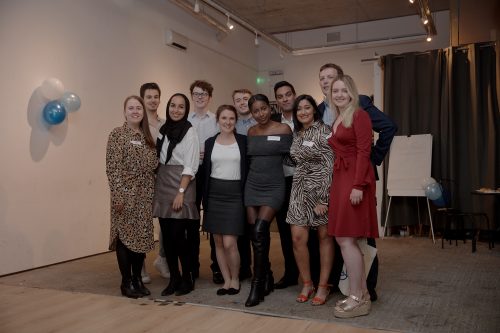Alumni
Jouja, a member of our Alumni Leadership Board, discusses the relationship between migration and social mobility.
My father was in his early twenties when he came to the UK. He was a young student looking to develop his studies and expand his horizons. Throughout my life, my mixed heritage has been a source of pride. I’ve seen having access to another nationality, another culture and another passport as an asset. As I’ve focused on championing social mobility in the UK, based on my own experiences and through the work of the Sutton Trust, I have questioned where my migratory past fits into the understanding of what social mobility is, and more importantly, how to achieve it.
In migration terms, I am classified as being part of the “2.5 generation”. I have one UK-born parent and one foreign-born parent. The wider “second-generation” umbrella includes the over a quarter of people under 18 living in the UK who have at least one foreign-born parent. A further 6% of people under 18 were themselves born abroad, the majority of whom immigrated under the age of 6 and will have spent most of their lives in the UK by the time they reached university age.
As discussions of social mobility expands to include the role of other identities beside class in driving disadvantage, and moves towards a more intersectional approach, there is still limited research on the role someone’s migration story has in their encounters with social stratification. Often, migrants are conflated with ethnic minorities and analysed as such. However, not all migrants are of an ethnic minority and not all ethnic minorities have migration in their recent history.
Is there something specific to the act of migrating, or having a parent who migrated, in shaping someone’s social mobility story?

When I was a child, we used to visit my father’s home country every now and then. It was a time to build relationships with family and learn about a culture and religion that was an important part of my identity. However, as many of those in the diaspora can relate to, I would feel shamefully privileged in comparison to my non-British cousins. It was not even so much about differing financial means, but more so a recognition of the reverence for Western culture – and me as an embodiment of that – that decades of imperialism had curated. How could I reconcile my apparent wealth when visiting Algeria with my economic constraints growing up in a low-income family in the UK? Second-generation migrants’ very definition of social mobility may differ to their non-immigrant peers. If social mobility is relative, who are we comparing it to? Our family abroad or the non-immigrant population? The resulting feeling is one of both gratitude and frustration.
Migratory history and economic status are intrinsically linked. When a person immigrates to the UK, the majority will experience downward mobility regardless of their social class back in their country of origin. There are four main reasons why; language barriers, difficulties having foreign qualifications recognised, differing standards of educational attainment, and lack of recruitment networks. The extent of this downward mobility is, of course, exacerbated by many other factors such as race, gender, geography, and the type of migration (e.g. forced or voluntary). As a result, many migrants are unable to access the social, cultural, and economic capital necessary for social mobility.
While first-generation migrants tend to experience downward mobility, second-generation migrants often fare better when it comes to educational attainment. One reason for this is the positive attitudes towards education held by immigrant populations; for example, education is often seen as a gateway to success or a way of insuring against the labour market setbacks that the first-generation experienced.
This is not always the case. For some, their migration story can further entrench the social mobility barriers non-immigrants face, and even present new ones. One social mobility barrier identified by the Sutton Trust is parental cultural capital – parents from lower socioeconomic backgrounds are less likely to be familiar with choices and strategies around school selection, less likely to take a representative position in their children’s school and their children have lower rates of extra-curricular activities.
For immigrant parents, these barriers are even higher as they tackle adjusting to a new school system on top of a new country. Their lack of experience with UK education themselves, makes them even less equipped than their non-immigrant counterparts to help their children through it. I remember distinctly a frustrating moment when my father tried to help me with my maths homework, using methods he had been taught in his home country that were not the same as the ones used in the British education system. Even where parents have educational experience, the gulf between the different education systems can be vast.
Additionally, there are a unique set of barriers due to legal migration status. The hostile – or ‘compliant’ – environment is designed to increase the barriers for migrants so that they would be more inclined to voluntarily leave the UK. These are perhaps the most immovable barriers, requiring more than early interventions and assistance from the third sector, but rather active policy and legislative reform. For instance, those without ‘settled status’ were ineligible for student finance or home fees for higher education, despite many having lived in the UK for most of their life. The Let Us Learn campaign changed the legislation in 2015, however its existence in the first place demonstrates that the barriers in a migrant’s social mobility journey can be inherently different.
This begs the question, where do ‘migration’ issues stop and ‘social mobility’ issues start?
Second-generation success in education does not continue into the workplace; according to Runnymede, “educational success hasn’t translated into social mobility or economic opportunities, most notably in the labour market”. The ‘class’ ceiling – the limitations those from low socioeconomic backgrounds face despite education – is just as prevalent, if not more so, for those with migrant backgrounds.
Compared to non-immigrants, second generation migrants are less likely to be in a salariat position, more likely to be unemployed and have lower chances of career progression. This last factor is particularly important. Migrant Leaders, an organisation helping migrants in the UK realise their capabilities and fulfil their potential, works to change the fact that only 1.3% of Directors of FTSE100 Companies are migrants of colour, most of whom are privately educated. If education isn’t the magic equaliser so many hope it to be, then must we look to other factors to explain the gap between second-generation and non-immigrant peers?
My own journey through social mobility as someone from the “second-generation” has been at times confusing. To what extent are the barriers I’ve faced due to having a foreign-born parent? Is it even possible to separate this as a category from my socio-economic, racial, religious and gender identities? For multiple reasons, including my citizenship status, my access to a British-born parent, and geographic location – the acute effects of my migrant story have been mitigated compared to others. I have not had the additional labour of needing to translate for my parents, help them navigate the British legal or administrative system or worry about my citizenship status – all factors that have not even been touched upon in this post.
From my experience and my studies, it is evident that there is still much work to be done to identify opportunities for broadening access and addressing inequality between different backgrounds in both education and the workplace. It is imperative that we view social mobility as a continually changing playing field, and that we understand its intersections with other areas of inequities. For me, understanding and advocating for migrant issues is integral to building an inclusive social mobility agenda.
In championing social mobility, we must make sure that we are championing social mobility for all.
Jouja Maamri is a member of the Sutton Trust Alumni Board and was a participant on their U.S. Programme in 2013. She completed an MSc in Migration Studies from the University of Oxford in 2019.
